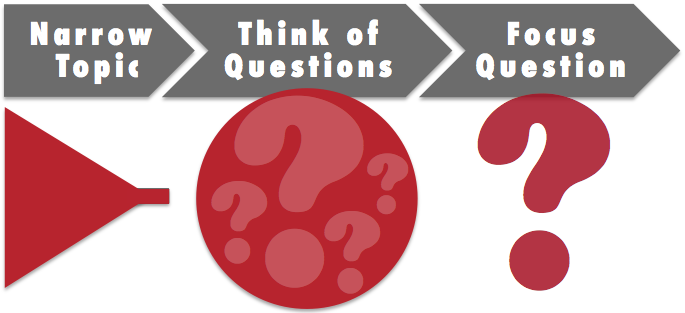Because of all their influence, you might worry that research questions are very difficult to develop. Sometimes it can seem that way. But we’ll help you get the hang of it and, luckily, none of us has to come up with perfect ones right off. It’s more like doing a rough draft and then improving it. That’s why we talk about developing research questions instead of just writing them.
Steps for Developing a Research Question
The steps for developing a research question, listed below, can help you organize your thoughts.
Step 1: Pick a topic (or consider the one assigned to you).
Step 2: Write a narrower/smaller topic that is related to the first.
Step 3: List some potential questions that could logically be asked in relation to the narrow topic.
Step 4: Pick the question that you are most interested in.
Step 5: Change that question you’re interested in so that it is more focused.
MOVIE: Developing Research Questions
As you view this short video on how to develop research questions, think about the steps. Which step do you think is easiest? Which do you think is hardest?
[iframe src=”https://www.youtube.com/embed/1oJNO6PYZe4″ width=”560″ height=”315″ allowfullscreen=”allowfullscreen”]
Practice
Once you know the steps and their order, only three skills are involved in developing a research question:
- Imagining narrower topics about a larger one,
- Thinking of questions that stem from a narrow topic, and
- Focusing questions to eliminate their vagueness.
Every time you use these skills, it’s important to evaluate what you have produced—that’s just part of the process of turning rough drafts into more finished products.

ACTIVITY: Developing a Research Question
Maybe you have a topic in mind, but aren’t sure how to form a research question around it. The trick is to think of a question related to your topic, but not answerable with a quick search. Also, try to be specific so that your research question can be fully answered in the final product for your research assignment.
ACTIVITY: Thinking of Questions
For each of the narrow topics below, think of a research question that is logically related to that topic. (Remember that good research questions often, but not always, start with “Why” or “How” because questions that begin that way usually require more analysis.)
Topics:
- U.S. investors’ attitudes about sustainability
- College students’ use of Snapchat
- The character Scout in To Kill a Mockingbird
- Nature-inspired nanotechnologies
- Marital therapy
After you think of each research question, evaluate it by asking whether it is:
- Logically related to the topic
- In question form
- Not answerable with a quick Google search
- Specific, not vague
Sometimes the first draft of a research question is still too broad, which can make your search for sources more challenging. Refining your question to remove vagueness or to target a specific aspect of the topic can help.
ACTIVITY: Focusing Questions
The first draft research questions below are not focused enough. Read them and identify at least one area of vagueness in each. Check your vagueness with what we identified. It’s great if you found more than we did because that can lead to research questions of greater specificity. See the bottom of the page for the answers.
First Drafts of Research Questions:
- Why have most electric car company start-ups failed?
- How do crabapple trees develop buds?
- How has NASA helped America?
- Why do many first-time elections soon after a country overthrows a dictator result in very conservative elected leaders?
- How is music composed and performed mostly by African-Americans connected to African-American history?
ANSWER TO ACTIVITY: Focusing Questions
Some answers to the “Focusing Questions” Activity above are:
Question 1: Why have most electric car company start-ups failed?
Vagueness: Which companies are we talking about? Worldwide or in a particular country?
Question 2: How do crabapple trees develop buds?
Vagueness: There are several kinds of crabapples. Should we talk only about one kind? Does it matter where the crabapple tree lives?
Question 3: How has NASA helped America?
Vagueness: NASA has had many projects. Should we should focus on one project they completed? Or projects during a particular time period?
Question 4: Why do many first-time elections soon after a country overthrows a dictator result in very conservative elected leaders?
Vagueness: What time period are we talking about? Many dictators have been overthrown and many countries have been involved. Perhaps we should focus on one country or one dictator or one time period.
Question 5: How is music composed and performed mostly by African-Americans connected to African-American history?
Vagueness: What kinds of music? Any particular performers and composers? When?

